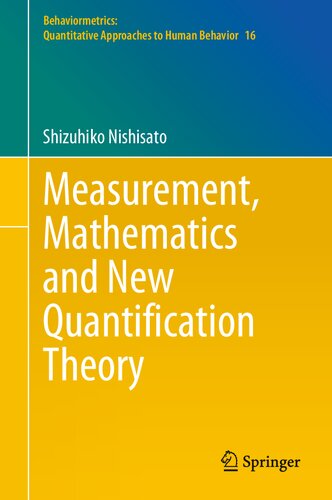

Most ebook files are in PDF format, so you can easily read them using various software such as Foxit Reader or directly on the Google Chrome browser.
Some ebook files are released by publishers in other formats such as .awz, .mobi, .epub, .fb2, etc. You may need to install specific software to read these formats on mobile/PC, such as Calibre.
Please read the tutorial at this link: https://ebookbell.com/faq
We offer FREE conversion to the popular formats you request; however, this may take some time. Therefore, right after payment, please email us, and we will try to provide the service as quickly as possible.
For some exceptional file formats or broken links (if any), please refrain from opening any disputes. Instead, email us first, and we will try to assist within a maximum of 6 hours.
EbookBell Team

0.0
0 reviewsThe purpose of this book is to thoroughly prepare diverse areas of researchers in quantification theory. As is well known, quantification theory has attracted the attention of a countless number of researchers, some mathematically oriented and others not, but all of them are experts in their own disciplines. Quantifying non-quantitative (qualitative) data requires a variety of mathematical and statistical strategies, some of which are quite complicated. Unlike many books on quantification theory, the current book places more emphasis on preliminary requisites of mathematical tools than on details of quantification theory. As such, the book is primarily intended for readers whose specialty is outside mathematical sciences. The book was designed to offer non-mathematicians a variety of mathematical tools used in quantification theory in simple terms. Once all the preliminaries are fully discussed, quantification theory is then introduced in the last section as a simple application of those mathematical procedures fully discussed so far. The book opens up further frontiers of quantification theory as simple applications of basic mathematics.